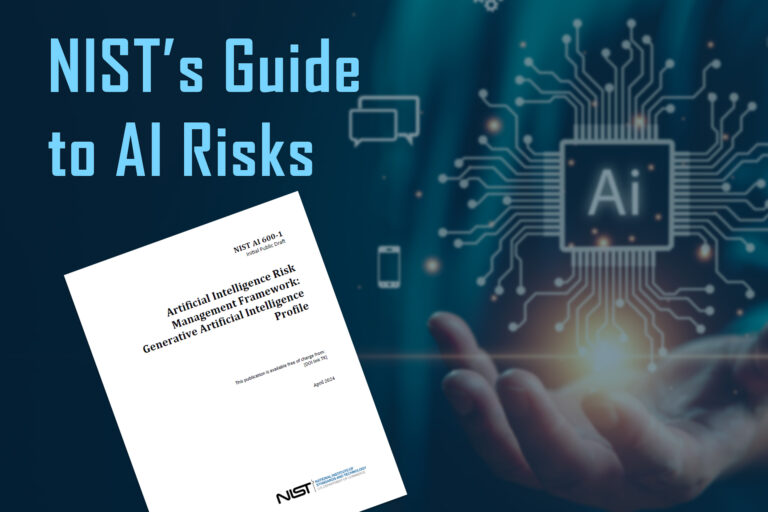Top Takeaways from the 2025 Data Breach Investigations Report
The 2025 Data Breach Investigations Report (DBIR) by Verizon delivers critical insights every cybers

Over the past year, AI has transformed the technology and cybersecurity landscape, introducing urgent and complex new concerns, prompting the drafting of NIST AI 600-1 to address these issues. As part of its broader Artificial Intelligence Risk Management Framework (AI RMF), the National Institute of Standards and Technology (NIST) developed this document to tackle the unique risks associated with generative AI technologies, which have notably advanced in their capabilities and potential for misuse.
Understanding NIST AI 600-1: A New Paradigm in Cybersecurity
The NIST AI 600-1, also known as the “Generative AI Profile,” outlines several risks associated with generative AI. These include the potential for AI to automate cyberattacks, generate disinformation, and engage in social engineering. The draft highlights the dual-use nature of generative AI technologies—powerful tools that can drive innovation and present significant risks if not properly managed.
This structure guides developers and cybersecurity professionals in identifying and mitigating these risks. The document outlines numerous recommended actions, emphasizing the need for a proactive approach to secure AI systems against emerging threats. This guidance is crucial as it helps frame generative AI not just as a technological advancement but as a cybersecurity priority.
Below are specific examples from the draft document detailing recommended actions aimed at mitigating these risks:
These are just a few examples among the nearly 400 recommended actions.
Implementing frameworks like NIST AI 600-1 can induce anxiety among stakeholders, from developers, compliance, and security personnel to business leaders. This anxiety stems from the dual pressures of harnessing AI’s potential, which can be incredible when used ethically and responsibly and safeguarding against its risks. For many, this represents a shift towards more rigorous standards and practices in AI development and deployment, like those seen in traditional areas of cybersecurity.
The anxiety is not without merit, as the misuse of AI can have far-reaching consequences. For instance, AI-driven disinformation campaigns can undermine democratic processes, while AI-enabled cyberattacks can breach sensitive data at unprecedented scales. Plus, now having to manage the risks and adopt another framework creates complexity and more anxiety.
As AI continues to integrate into various sectors, the principles laid out in NIST AI 600-1 will likely become benchmarks for industry practices, much like how cybersecurity frameworks have evolved. Organizations may soon find that adherence to such frameworks is not just best practice but a requirement, influencing everything from regulatory compliance to consumer trust.
The draft form of NIST AI 600-1 is open to the public and can be found here: https://airc.nist.gov/docs/NIST.AI.600-1.GenAI-Profile.ipd.pdf.
The drafting of NIST AI 600-1 marks a significant step in recognizing and addressing the complex risks associated with generative AI. By setting clear guidelines and recommendations, NIST is steering the conversation towards a more secure and trustworthy AI ecosystem. For developers, cybersecurity professionals, and policymakers, engaging with this framework is not just about mitigating risks but also about shaping the future of AI in a way that is safe, secure, and aligned with broader societal values.
As we continue to navigate the challenges and opportunities presented by AI, documents like NIST AI 600-1 will play a pivotal role in defining the standards for responsible AI development and deployment. Ongoing dialogue about these guidelines is crucial, helping to refine our approaches and ensuring that AI technologies contribute positively to society while minimizing their potential for harm.

Brent Neal, the lead vCISO and principal advisor at Vanguard Technology Group, brings over 25 years of extensive experience in Security, IT, and GRC departments. With expertise in strategy, governance, program development, and compliance, Mr. Neal has paved the way for VTG’s comprehensive services. We specialize in providing holistic consulting, strategic planning, and tailored solutions to meet the unique security needs of various industries. Our expert guidance helps organizations establish a strong security posture, align initiatives with business objectives, and confidently navigate the evolving cybersecurity landscape.
Share our blog and spread cybersecurity knowledge!

The 2025 Data Breach Investigations Report (DBIR) by Verizon delivers critical insights every cybers
In 2023 alone, healthcare breaches exposed over 40 million patient records, underscoring the critica
Ransomware trends in 2024 reveal escalating threats, evolving attack methods, and critical lessons f
Over the past year, AI has transformed the technology and cybersecurity landscape, introducing urgen
Many companies face challenges in effectively prioritizing and maturing their security domains, such
One of the greatest cyber threats facing businesses today is ransomware, and many are uncertain abou

Security Leadership (Virtual CISO)
Program Development & Maturity
Compliance Services
Advisory & Consulting Services
© All Copyright 2023-2024 by Vanguard Technology Group